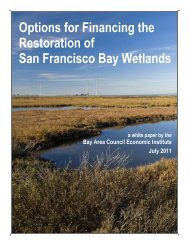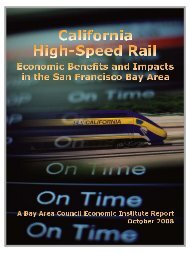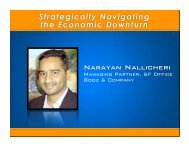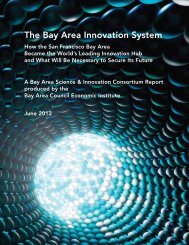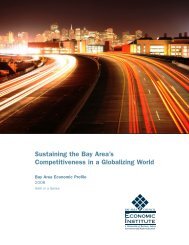Ties That Bind - Bay Area Council Economic Institute
Ties That Bind - Bay Area Council Economic Institute
Ties That Bind - Bay Area Council Economic Institute
You also want an ePaper? Increase the reach of your titles
YUMPU automatically turns print PDFs into web optimized ePapers that Google loves.
10<br />
<strong>Ties</strong> <strong>That</strong> <strong>Bind</strong><br />
Building Bridges, Leveraging Assets<br />
The San Francisco <strong>Bay</strong> <strong>Area</strong>’s relationship with China is a unique asset and an important contributor<br />
to the regional, state and national economies. But it would be a mistake to take the relationship<br />
for granted.<br />
A growing economy is offering attractive opportunities for Chinese students and scientists to<br />
stay at home to build companies and careers, at the same time as immigration restrictions are<br />
making it more difficult for Chinese to come to the U.S. Chinese universities and technical institutes<br />
turn out more than 350,000 engineering graduates annually, and the quality of China’s<br />
educational institutions is improving rapidly. Incentives including cash grants, startup funding<br />
and technical support after graduation, and exemption from military service (in Taiwan), are offered<br />
to students who stay home to attend university. The scale of China’s market offers talented<br />
Chinese entrepreneurs and managers an opportunity to build new companies and industries from<br />
scratch. Meanwhile, post-September 11 security policy has made it more difficult for Chinese<br />
students and professionals in specialized fields to obtain J-1 visas, and demand far exceeds supply<br />
for H-1B visas.<br />
In the course of conducting interviews and other research for this report, a number of ideas surfaced<br />
for ways to position the <strong>Bay</strong> <strong>Area</strong>’s economy in relation to China, and to further expand<br />
the <strong>Bay</strong> <strong>Area</strong>-China relationship. These fall into two broad categories: a) policy measures in Sacramento<br />
and Washington to strengthen U.S. competitiveness; and b) measures that can be taken<br />
by the public and private sectors in the <strong>Bay</strong> <strong>Area</strong> to leverage regional assets, expand trade and<br />
investment opportunities, and strengthen the <strong>Bay</strong> <strong>Area</strong>’s position as the premier U.S. gateway for<br />
business and other exchanges with China. Some of these ideas reflect broad statewide and national<br />
competitiveness concerns, while others focus on specific local policy measures.<br />
Among them:<br />
(�RQRPL� �RPSHWLWLYHQHVV<br />
1. Strengthen science and math education at the university and high school levels;<br />
2. Promote closer cooperation between industry and education to support continuous<br />
workforce skills development and training;<br />
3. Keep the door open to overseas student, scientific and professional exchanges;<br />
4. Increase federal and state funding for scientific research;<br />
5. Ensure that Federal trade and investment policies avoid politicization and reflect the reality<br />
global markets<br />
%D\ $UHD ,QLWLDWLYHV<br />
6. Elevate the priority of Chinese-language instruction in elementary education, high schools<br />
and junior colleges;<br />
7. Promote the <strong>Bay</strong> <strong>Area</strong> as a location for Chinese investment;



